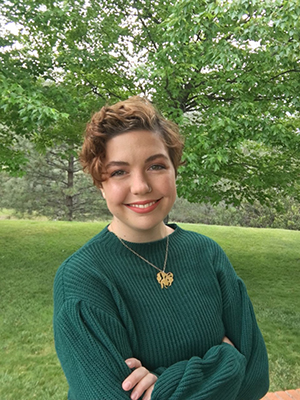Firstly, can you tell me about your honors project?
My honors project is a research paper that explores the ethics of art forgery and restoration. It delves into the history of forgery and copies in Ancient Greece and Rome, then skips ahead to the Renaissance and the 19th Century art market. The purpose is to understand our modern conception of art forgery in the context of historical understandings, as well as analyze the assignation of value to works of art. In this paper I also critique methods of art restoration and how we can understand the ethics of some restoration practices in the greater framework of art forgery.
What is your hope for this project?
My hope is that a greater critical approach is applied to art restoration. I also hope that people may take away a greater understanding of the history of art forgery to understand it as a modern phenomenon developed in a capitalist context, and to be more critical of the ways that we instantly demonize a work of forgery. There will also be a touch of Marxism in this paper and ideally this will encourage people to engage with criticisms of cultural capital!
Did you pull from anything in particular as you formulated your project? Can you tell me a bit about your journey through SU and how that has led you to where you are today?
This project was largely inspired by my personal interests in art history! I spent my sophomore year abroad in Florence, Italy studying ancient Mediterranean and Renaissance art both as a personal pilgrimage but also to contextualize my own fascinations with older art. Seattle University's Art History department is fantastic, but I needed to go to the source of my passion to fully immerse myself in ancient art. Obviously, this was a life-changing experience, and it was here that I learned more about the 19th century market for ancient and Renaissance art in Florence and how this led to a spike in forgery to satiate the demands of (primarily) English collectors.
Once I returned from abroad, I began taking classes in Roman history, where the obsession really set in! While abroad, I volunteered with the organization Ars et Fides and gave tours of Florence's art inside its greatest cathedrals and churches. A lot of the art on my tours was discovered during restoration after centuries of being hidden under whitewash or behind altars, and this sparked my excitement for art restoration! It's almost like a treasure hunt, and the knowledge that you're preserving something for the next generations to marvel at is powerful. I also spent time at Palazzo Spinelli, where the Institute for Art and Restoration in Florence is located. It was here that I was first exposed to the idea of ethics in art restoration, and how their work is done in a way that does not attempt forgery, but rather celebrates the damaged parts of paintings (for example) as a part of its history.
Did your path to this project have any surprise twists and turns that shaped your current day?
I definitely went on a lot of wild goose chases in the research portion of this project, because I would try to glean meaning from something that simply wasn't there! It was also hard for me to avoid cherry-pick sources that would conveniently fit my paper, because I started out with a clear idea of what I wanted to be true and attempted to morph evidence to fit this idea. Once I abandoned that and let the sources guide my argument and research, it became so much easier! I just had to overcome my own stubbornness first.
Do you have any specific goals or a plan for after graduation?
After graduation, I plan to take a year off before applying to graduate school. I have my eye on a few art restoration programs as that's been my goal for quite a while! This project really helped me understand the field of art restoration, as well as provide me with the tools to be critical of the ethics of art restorers. COVID-19 hasn't really changed my plans, because art will always need restoration and conservation--these pieces are truly not getting any younger! So yes, graduate school is still definitely my plan. When I was about nine years old I decided I would one day hold seven PhDs so I'm holding myself to that!

